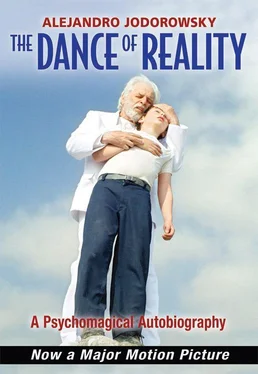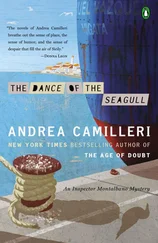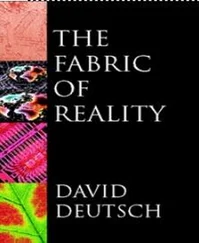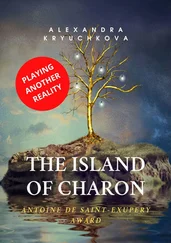“Excuse me, Alejandro, for interrupting. I have seen your film El Topo several times, so I am happy to greet you. I am Carlos Castaneda.”
He could have been a con man — nobody knew the face of the writer — but I believed him. Later I found through a drawing in a book and a photo published by his ex-wife that it was indeed he. Troika also believed him. Although she had never read his works, she seemed intoxicated by his fame. With an offhand gesture, as if the heat was bothering her, she opened her neckline, showing the tip of one of her two magnificent promontories, and inflated her lips as if kissing an invisible phallus to whisper, “How interesting!” Castaneda, after casting a falcon’s eye on the living flesh that was being displayed above a bloody beefsteak, smiled: “If we have met, it must be for some reason. I would like to talk to you in a quieter place.” I suggested to Castaneda that we go to his hotel, but he insisted on coming to mine. I, being a successful producer, was staying at the luxurious Camino Real. What better place to meet with Castaneda than a Camino Real (Royal Path)! We agreed that he would come the next day at noon.
I waited impatiently. At five minutes to twelve, the phone rang in my room. I said, “He must surely be calling to tell me he can’t come.” I answered. In a respectful tone, he asked me if it would bother me to receive him slightly before the scheduled time. Such tact was touching to me. As soon as he entered, I offered him a chair. We sat face-to-face and locked eyes, scrutinizing one another like two warriors, but certainly without any aggression and of course with much hope of finding a pleasant interlocutor. How long did this last? An eternity. He was the first to speak. Soon I arrived at the question we were interested in:
“In your books you have revealed a way of seeing the world differently, you have revived the concept of the spiritual warrior, you have made the topic of lucid dreams current again, and yet I do not know whether you are a madman, a genius, or a liar.”
“Everything I tell is true. I have not invented anything,” he replied with a bright smile.
“Reading your works I have the impression that, based on actual experiences in Mexico, you have developed and introduced concepts drawing on the universal esoteric tradition. In your books one can find Zen, the Upanishads, the Tarot, Hervey de Saint-Denys’s work on dreams, and so forth. However, I am sure of one thing: it’s evident that you have traveled all around this country to do your research. It seems likely that, bringing together all your findings, you have created the figure of Don Juan.”
“Absolutely not. I assure you, he exists. ”
And as he continued he told me how the shaman (with whom he had been walking on the Paseo de la Reforma, the central artery of Mexico City) had, with a simple slap on the back, projected him several kilometers away because he had been distracted by a woman passing by. Then he talked about the sexual life of Don Juan, who was capable of ejaculating fifteen times in a row. I remember he also told me that his master despised those human beings who “manufactured” children, sacrificing their magical abilities. “Every child steals a piece of the soul.” He introduced the topic of Saturnine cannibalism. But, perhaps seeing my look of horror, he changed the subject:
“Why have circumstances brought us together? Could it be for us to make a film? Hollywood has offered me several million dollars to bring my first book to the screen, but I don’t want Don Juan to be played by Anthony Quinn.”
We were starting to agree on the possibilities of filming at the real sites, showing true miracles, real shamans, without using special effects and stunts that would turn all those teachings into banal fairy tales, when Castaneda began to have stomach pains, something that he said, between moans, never happened to him. In the mountains he drank water from streams without any ill effect, but in the city, where the water was ostensibly potable, he suffered from diarrhea. He began to squirm more and more. I called a taxi and accompanied him to his hotel, the Holiday Inn. Due to the usual traffic congestion, it took us almost an hour to get there. As soon as we had shaken hands, he ran off. I never saw him again. At the same time that he suffered those stomach cramps I had been struck by a violent pain in my liver that kept me in bed for three days. Once recovered, I called the hotel. He was gone and had left no address. When I stopped by there, the porter I questioned told me that the gentleman had been accompanied by an attractive woman, and his description matched the appearance of Troika. For a long time, Castaneda’s diarrhea caused me no suspicion. This malady, which the Mexicans call “Moctezuma’s revenge,” attacks a great many tourists, but little by little, recalling the details of our meeting, I began to have some doubts. Diarrhea requires speedy evacuation. Why hadn’t Castaneda used my bathroom? That would have brought him quick relief. If he needed to shit, how did he resist the urge in the taxi for over an hour? Moreover, this obnoxious illness tends to make people curl into a knot around the abdomen, rather than squirming, which can bring on an attack of nausea. Besides his stomach, intestines, and viscera hurting, he also seemed to be feeling pain in his muscles and bones. Perhaps some spirit sent by other sorcerers attacked both of us at the same time in order to prevent us from realizing the project, which would have meant revealing certain secrets to the entire world. or else his body, running out of its usual drug, needed a morphine injection, like Ichazo. I have never solved this mystery. Troika disappeared from the soap operas. Someone told me that she had signed a contract to work for five thousand years on L. Ron Hubbard’s ship.
Óscar Ichazo’s withdrawal had left me frustrated. I felt that I had lost the opportunity to have an essential experience. However, the dance of reality granted me that opportunity. Francisco Fierro, a painter and friend of mine, came back from Huautla, where he had gone to eat mushrooms with the famous Mazatec curandera María Sabina. He came looking for me at the house where I had already been holed up for a month with my group of “actors,” preparing to film The Holy Mountain. Ichazo had left us two instructors, Max and Lydia, who, certain that they possessed the supreme secrets, managed us like tyrants. She was an American of short stature, nearsighted and fat, and he a thin and gangly man, his face invaded by pimples. We were allowed to sleep only four hours a night, from midnight to four, and the rest of the time we had to spend on all manner of pseudo-Sufi, pseudo-Buddhist, pseudo-Egyptian, pseudo-Hindu, pseudoshamanic, pseudo-tantric, pseudo-yogic, and pseudo-Taoist exercises. These exercises ultimately were no use to us whatsoever. Francisco Fierro brought me a jar full of honey in which there were six pairs of fungi.
“It’s a gift from María Sabina. She saw you in her dreams. It seems that you are going to accomplish something that will help our country. When? What? She didn’t say. What she did say was that she, and others like her, want to help you. Eat them all. They are males and females. Those that aren’t of use to you, your body will reject and vomit up. She said to eat them at night, so that you will advance toward the light and see the dawn for the first time.”
While my actors went to sleep, awaiting the gong that would sound four hours later to invite them to take their cold shower, I lay on the roof, naked in a sleeping bag, and ingested the mushrooms. The hallucinations were not just visual this time. The ensemble of all my senses acquired fantastic characteristics. I began to realize that what I considered to be “myself ” was merely a mental construct obtained on the basis of sensations. “I only feel how I think I am.” The toxins in the mushrooms then began to show me other possibilities. I understood that I constructed myself from the intellect: “this is a hand,” “this is my face,” “I am a man,” “here are my limits.” Now something was telling me, “When you speak of limits, you actually mean unknown infinities. You can be something more than a human.”
Читать дальше












